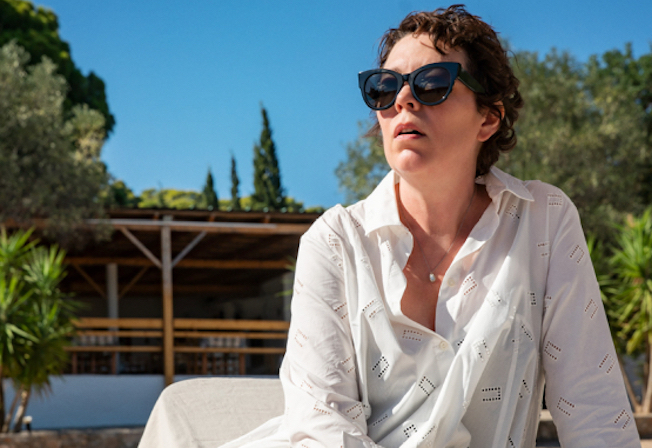 With The Lost Daughter actress Maggie Gyllenhaal makes a brilliant debut as writer-director, and in the process, guides Olivia Colman (best known for The Crown) to her finest – and most subversive – performance to date. Adapted from a novella by the Italian novelist Elena Ferrante, this richly complex film presents a woman who raised two daughters but did not love the job. What does it mean to love your children, the film asks, but also want to run from them toward the other, better self you know you were meant to be? From moment to moment, who are you then?
With The Lost Daughter actress Maggie Gyllenhaal makes a brilliant debut as writer-director, and in the process, guides Olivia Colman (best known for The Crown) to her finest – and most subversive – performance to date. Adapted from a novella by the Italian novelist Elena Ferrante, this richly complex film presents a woman who raised two daughters but did not love the job. What does it mean to love your children, the film asks, but also want to run from them toward the other, better self you know you were meant to be? From moment to moment, who are you then?
Colman plays Leda Caruso, a literature professor from Boston who arrives at a Greek island resort with a plan to sit on the beach and work. When a large and boorish family from Queens, New York, whom the cabana boy (Paul Mescal) will describe as “bad people,” lays claim to the beach just in front of her chair, Leda’s face tenses. She refuses to move to another spot on their behalf, a stand that wins her the admiration of Nina (Dakota Johnson), a mother in the group whose increasingly fraught connection to her little girl will ignite Leda’s memories of her own years as a stressed mother to two daughters.
Seen in beautifully textured flashbacks that gradually form a counter narrative to the Greek holiday, the young Leda (played by a superb Jessie Buckley) is depicted as a mother devoted to her children, but also at war with them without quite knowing it. When her daughter Bianca cuts her hand while imitating the way her mother cuts fruit, Leda refuses to kiss it and make it better. She’s furious because it’s Sunday and that’s meant to be her day to work on her graduate thesis, but her husband Joe (Jack Farthing) isn’t keeping his end of their bargain. “I felt their gazes longing to tame me,” Leda says of her daughters in the first-person perspective-driven novella.
In Greece, Nina’s daughter has wrapped her body around her mother’s and won’t let go. The little girl’s beloved doll has gone missing and if her anguish is wrenching, it is also, as only Leda can see, cloying and oppressive. Leda sees herself in Nina’s dilemma and the cavalcade of forgotten feelings that come forth almost makes her faint. Leda’s fractured past, which she appears to have kept at bay for many years, has come crashing into her present, and over the course of this holiday, she will act out in ways that will strike many as monstrous.
The Lost Daughter (in theaters now and coming to Netflix on Dec. 31st) has plot turns it wouldn’t be fair to reveal and though Gyllenhaal cultivates the story’s points of suspense, that tension is always grounded in character and emotion. In Colman, she has an actor with a unique gift for suggesting an inner swirl of doubt leavened by sudden bursts of clarity. For Leda, it is often language that brings life back into focus and toward that end, The Lost Daughter is rich with quoted poetry used as a means to reveal or seduce or simply define a given moment. Leda’s young daughter dazzles a dinner guest when she quotes W.H. Auden, in a line she’s heard her mother say to calm herself: “Chill of the crooked wing/Falls down along my body.”
We fail ourselves first, Leda might say, but language rarely does. Neither will this film, which, like a great poem, should stand the test of time.
Advertising disclosure: We may receive compensation for some of the links in our stories. Thank you for supporting LA Weekly and our advertisers.

